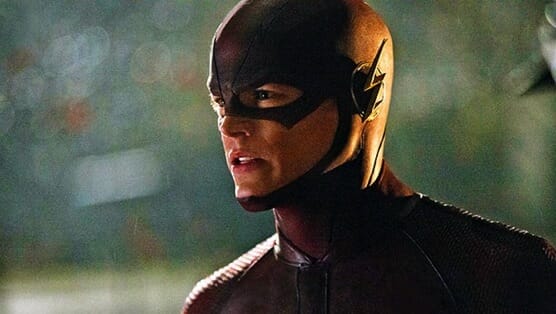The Flash: “Pilot”
(Episode 1.01)

Making a good pilot is never easy. For one, it necessitates introducing loads of exposition in terms of building the world and establishing central characters—not to mention somehow fitting in a plot that gives a template for what subsequent episodes will look like. Even some of the greatest TV shows of all time (Buffy, Seinfeld, Star Trek: Next Generation, to name a few) can get tripped up by demanding requirements of “the pilot episode.”
Granted, as a spin-off, The Flash has the advantage of being set in a pre-established world, with the character of Barry Allen (Grant Gustin) having been introduced during a two-episode arc in last year’s Arrow. Perhaps because the show’s creators have had so long to mull on this character, the Flash pilot (pardon all subsequent puns) speeds along with an efficiency and confidence that places it in the top-tier of this year’s new TV offerings.
As the episode opens, we are promptly reintroduced to Barry, the Central City-based forensics assistant who traveled to Starling City to help Oliver solve a case (and saved his life in the process). What we didn’t know about Barry is, as with many superheroes, he carries dark familial trauma in his past. As a young boy, Barry watched helplessly as a mysterious lightening formation invaded his living room and killed his mother. Barry’s father, Henry (John Wesley Shipp, a great bit of casting considering he played The Flash in the beloved, yet short-lived 1990 CBS show), was then arrested for his wife’s murder.
After this flashback, the show catches us up to present-day Barry. He now works in the police department under the supervision of father figure Detective Joe West (Jesse L. Martin). Shortly after returning from his encounter with The Arrow (one major set-back for those without knowledge of Arrow, Barry hints at a dramatic encounter that we never see), he watches as the city’s Particle Accelerator experiences a meltdown. In the midst of the chaos, Barry is struck by lightning, and put into a nine-month coma.
Upon awakening, Barry quickly realizes that not only has he gained a killer set of abs, but he now has the ability to run faster than any man alive. With the help of scientists Caitlin Snow (Danielle Panabaker) and Cisco Ramon (Carlos Valdes) as well as Harrison Wells (Tom Cavanagh), the inventor of the disastrous Particle Accelerator who has been left paralyzed by the accident, Barry must realize his potential and emerge as the hero he was destined to become. And it couldn’t have happened at a more perfect time since the city is being terrorized by Clyde Mardon, a criminal who—in the wake of the particle accelerator explosion—now has the ability to control the weather (hello, Weather Wizard).
As I said before, there is much to love in this concise, yet enthralling 45 minutes. Unlike Arrow, a generally fun show often prone to Nolan-esque bouts of dark drama, Flash is perfectly fine with just being fun. Sure, there are moments of legitimate pathos, particular involving Barry’s backstory, but the episode as a whole feels much brighter and jokey than the likes of Arrow, and its brooding cast of characters. Not to say one is better than the other, but it’s nice to have an orange for every apple.
-

-

-

-

-

-

-

-

-

-

-

-

-

-

-

-

-

-

-

-

-

-

-

-

-

-

-

-

-

-

-

-

-

-

-

-

-

-

-

-








































